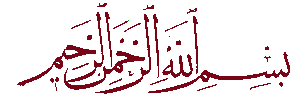 The ‘Five Pillars’ of Islam
are the foundation of Muslim life:
Faith or belief in the Oneness of God and the finality of the prophethood
of Muhammad;
The ‘Five Pillars’ of Islam
are the foundation of Muslim life:
Faith or belief in the Oneness of God and the finality of the prophethood
of Muhammad;
Establishment of the daily prayers;
Concern for and almsgiving to the needy;
Self-purification through fasting; and The pilgrimage to Makkah for those
who are able.
Iman or Faith
“There is none worthy of worship except God and
Muhammad is the messenger of God.” This declaration of faith
is called the shahadah, a simple formula that all the faithful pronounce.
The significance of this declaration is the belief that the only purpose
of life is to serve and obey God, and this is achieved through the teachings
and practices of the Last Prophet, Muhammad.
Salah or Prayer
Salah is the name for the obligatory prayers that
are performed five times a day, and are a direct link between the
worshipper and God. There is no hierarchical authority in Islam and there
are no priests. Prayers are led by a learned person who knows the Qur’an
and is generally chosen by the congregation. Prayers are said at
dawn, mid-day, late-afternoon, sunset and nightfall, and thus determine
the rhythm of the entire day. These five prescribed prayers contain verses
from the Qur’an, and are said in Arabic, the language of the Revelation.
Personal supplications, however, can be offered in one’s own language and
at any time. Although it is preferable to worship together in a mosque,
a Muslim may pray almost anywhere, such as in fields, offices, factories
and universities. Oftentimes visitors to the Muslim world are struck by
the centrality of prayers in daily life.
Zakah. The financial obligation
upon Muslims.
An important principle of Islam is that everything
belongs to God, and that wealth is therefore held by human beings
in trust. The word zakah means both “purification” and “growth.” Our possessions
are purified by setting aside a proportion for those in need and for the
society in general. Like the pruning of plants, this cutting back balances
and encourages new growth. Each Muslim calculates his or her
own zakah individually. This involves the annual payment of a fortieth
of one’s capital, excluding such items as primary residence, car
and professional tools. An individual may also give as much as he
or she pleases as sadaqa-h, and does so preferably in secret. Although
this word can be translated as “voluntary charity” it has a wider meaning.
The Prophet said, “Even meeting your brother with a cheerful face
is an act of charity.” The Prophet also said: “Charity is a necessity for
every Muslim.” He was asked: “What if a person has nothing?” The Prophet
replied: “He should work with his own hands for this benefit and then give
something out of such earnings in charity.” The Companions of the Prophet
asked: “What if he is not able to work?” The Prophet said: “He should help
the poor and needy.” The Companions further asked: “What if he cannot do
even that?” The Prophet said: “He should urge others to do good.” The Companions
said: “What if he lacks that also?” The Prophet said: “He should check
himself from doing evil. That is also an act of charity.”
Sawm or Fasting
Every year in the month of Ramada-n, all Muslims
fast from dawn until sundown—abstaining from food, drink, and sexual
relations with their spouses. Those who are sick, elderly, or on
a journey, and women who are menstruating, pregnant or nursing, are permitted
to break the fast and make up an equal number of days later in the year
if they are healthy and able. Children begin to fast (and to observe prayers)
from puberty, although many start earlier. Although fasting is beneficial
to health, it is mainly a method of self-purification and self-restraint.
By cutting oneself from worldly comforts, even for a short time, a fasting
person focuses on his or her purpose in life by constantly being aware
of the presence of God. God states in the Qur’an:
“O you who believe! Fasting is prescribed for
you as it was prescribed to those before
you that you may learn self-restraint.” (Qur’an
2:183)
Hajj or Pilgrimage
The pilgrimage to Makkah (the hajj) is an obligation
only for those who are physically and financially able to do so.
Nevertheless, over two million people go to Makkah each year from every
corner of the globe providing a unique opportunity for those of different
nations to meet one another. The annual hajj begins in the twelfth
month of the Islamic year (which is lunar, not solar, so that hajj
and Ramada-n fall sometimes in summer, sometimes in winter). Pilgrims wear
special clothes: simple garments that strip away distinctions of class
and culture, so that all stand equal before God. The rites of the
hajj, which are of Abrahamic origin, include going around the Ka’bah seven
times, and going seven times between the hills of Safa and Marwa as did
Hagar (Hajir, Abraham’s wife) during her search for water. The pilgrims
later stand together on the wide plains of ‘Arafat (a large expanse of
desert outside Makkah) and join in prayer for God’s forgiveness, in what
is often thought as a preview of the Day of Judgment. The close of
the hajj is marked by a festival, the ‘Id al Adha, which is celebrated
with prayers and the exchange of gifts in Muslim communities everywhere.
This and the ‘Id al Fitr, a festive day celebrating the end of Ramada-n,
are the two holidays of the Islamic calendar.
 Back Home
Mail me: Mohammed Salman
K R
Back Home
Mail me: Mohammed Salman
K R


